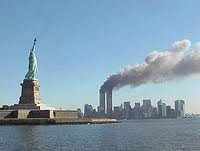 In the fall of 2001, Joan Didion, one of the great chroniclers of American politics and foreign policy, had just published a new book, Political Fictions. Shortly after the 9/11 attacks, she went on a book tour to promote her work.
In the fall of 2001, Joan Didion, one of the great chroniclers of American politics and foreign policy, had just published a new book, Political Fictions. Shortly after the 9/11 attacks, she went on a book tour to promote her work.
As Didion visited cities on the East and West coasts, she began to notice that the people she came to hear her were aghast and almost in a state of shock about the the way that their grief over 9/11 was being manipulated. The people she encountered during her tour, Didion wrote in a 2003 essay published in The New York Review of Books,
were making connections I had not yet in my numbed condition thought to make: connections between that political process and what had happened on September 11, connections between our political life and the shape our reaction would take and was in fact already taking.
These audiences, she went on,
recognized that even then, within days after the planes hit, there was a good deal of opportunistic ground being seized under cover of the clearly urgent need for increased security. These people recognized even then, with flames still visible in lower Manhattan, that the words ‘bipartisanship’ and ‘national unity’ had come to mean acquiescence to the [Bush] administration’s preexisting agenda.
Didion listed a number of items, such as “the systematic elimination of regulatory and union protections” and “funding for the missile shield,” that had been blessed with the holy grail of national security.
“Washington,” she concluded sadly, “was still talking about the protection and perpetuation of its own interests.”
Little did she know how prescient her words would become, particularly in the areas of terrorism, homeland security and intelligence. All you have to do is read today’s Guardian on “How private firms have cashed in on the climate of fear since 9/11” to understand. Or read my book, Spies for Hire.
